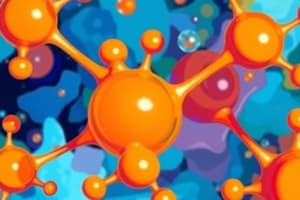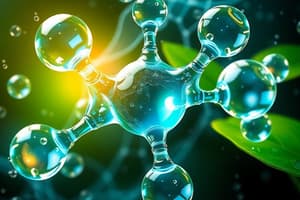Podcast
Questions and Answers
What is the primary function of the lone pairs of electrons in a water molecule?
What is the primary function of the lone pairs of electrons in a water molecule?
- Stabilizing the tetrahedral geometry of the molecule
- Acting as excellent hydrogen bond acceptors (correct)
- Participating in the formation of sigma bonds with hydrogen atoms
- Enhancing the electronegativity of oxygen
What is the consequence of the electronegativity difference between oxygen and hydrogen in a water molecule?
What is the consequence of the electronegativity difference between oxygen and hydrogen in a water molecule?
- Oxygen becomes partially positive and hydrogen partially negative
- The O-H bonds become nonpolar
- The sharing of electrons in the bond is equal
- Hydrogen becomes partially positive and oxygen partially negative (correct)
What is the significance of the bond angles in a water molecule?
What is the significance of the bond angles in a water molecule?
- It enables the molecule to act as a hydrogen bond acceptor only
- It allows the formation of four hydrogen bonds with neighboring molecules (correct)
- It makes the molecule completely nonpolar
- It allows the formation of six hydrogen bonds with neighboring molecules
What is the collective effect of the individual hydrogen bonds in water?
What is the collective effect of the individual hydrogen bonds in water?
What is the characteristic of the OH groups in a water molecule?
What is the characteristic of the OH groups in a water molecule?
What is the nature of the arrangement of electrons around the oxygen atom in a water molecule?
What is the nature of the arrangement of electrons around the oxygen atom in a water molecule?
What is the main reason for water's high boiling point?
What is the main reason for water's high boiling point?
What is the primary reason for water's ability to dissolve a wide variety of ions and molecules?
What is the primary reason for water's ability to dissolve a wide variety of ions and molecules?
What is the consequence of the breaking down of the ice lattice when water freezes?
What is the consequence of the breaking down of the ice lattice when water freezes?
What type of molecules can readily dissolve in water due to their ability to form hydrogen bonds?
What type of molecules can readily dissolve in water due to their ability to form hydrogen bonds?
Why do ice tubes and icebergs float on water?
Why do ice tubes and icebergs float on water?
What is the main difference between hydrophilic and hydrophobic molecules?
What is the main difference between hydrophilic and hydrophobic molecules?
Flashcards are hidden until you start studying
Study Notes
Electron Arrangement of Water Molecule
- The oxygen atom in a water molecule has six outer electrons, with two involved in covalent bonds to the hydrogens and four existing in nonbonded pairs (lone pairs).
- The lone pairs are excellent hydrogen bond acceptors, and the half-filled orbitals participate in the formation of a sigma bond between oxygen and hydrogen atoms.
- The electron arrangement around oxygen assumes a tetrahedral geometry.
Polarity of O-H Bonds
- The electronegativity difference between oxygen and hydrogen results in unequal sharing of electrons, making hydrogen partially positive and oxygen partially negative.
- The O-H bonds are polar, making the OH groups in water strong hydrogen bond donors and acceptors.
Hydrogen Bonding in Water
- Each water molecule can form hydrogen bonds with four other water molecules due to the bond angles.
- The additive effect of hydrogen bonds results in water having a well-ordered structure, explaining its internal cohesion and unusual properties.
Unusual Properties of Water
- Water has a high boiling point, high heat of vaporization, high viscosity, high surface tension, and high dielectric constant compared to other compounds of similar molecular weight.
- These properties are due to the extensive hydrogen-bonded network of water.
Properties of Water
- Water has a high boiling point for its molecular weight (18) compared to other molecules.
- Water's unusual properties include its high heat of vaporization, high viscosity, high surface tension, and high dielectric constant.
Structure of Ice
- When water molecules freeze, the hydrogen bonding becomes regular and clearly defined, creating a rigid tetrahedral molecular lattice in which each molecule is hydrogen-bonded to four others.
- The open structure of the ice lattice accounts for water's unusual property of being less dense as a solid than as a liquid.
Biological Importance of Water
- Water serves as the universal intracellular and extracellular medium due to its remarkable solvent ability.
- The ability arises from water's tendency to form hydrogen bonds and its dipolar character.
- Hydrophilic substances, which can take advantage of water's properties, can readily dissolve in water.
Studying That Suits You
Use AI to generate personalized quizzes and flashcards to suit your learning preferences.




